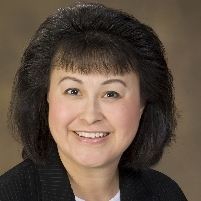Director of the Indian Health Service: Who is Yvette Roubideaux?
Tuesday, April 28, 2009

A physician and professor who has dedicated her career to combating diabetes, Yvette Roudideaux is the first Native American woman to head the Indian Health Service since it was founded in 1955.
Born in 1963, Roubideaux is a member of her father’s tribe, the Rosebud Sioux. Her mother’s tribe is the Standing Rock Sioux. Roubideaux grew up in Rapid City, South Dakota, and experienced first-hand the limited health care services available to Native Americans. “I often waited four to six hours to see a doctor,” she once wrote, “As a teenager, I realized that I had never seen an American Indian physician.” Driven to study medicine, she was accepted into Harvard, where she received her Bachelor of Arts degree, and then received her M.D. in 1989. She completed the Primary Care Internal Medicine Residency Program at Brigham & Women’s Hospital, Harvard Medical School’s teaching affiliate, in 1992, and was board certified in internal medicine. Roubideaux earned her M.P.H. at Harvard’s School of Public Health in 1997.
After finishing her studies at Harvard, she worked for the Indian Health Service in Arizona, first as a medical officer at the Hu Hu Kam Memorial Hospital on the Gila River Indian reservation for one year, followed by three years as a clinical director and medical officer at the San Carlos Indian Hospital on the San Carlos Apache Indian reservation
Roubideaux then completed the Commonwealth Fund/Harvard University Fellowship in Minority Health Policy, and later a faculty development fellowship at the Native American Center of Excellence at the University of Washington’s School of Medicine in 1998.
She joined the faculty at the University of Arizona, first as an assistant professor in both the College of Public Health and College of Medicine, and later in the Department of Family and Community Medicine. She also served as the director of the University of Arizona/Inter Tribal Council of Arizona Indians into Medicine (INMED) Program and director of the training program of the Inter Tribal Council of Arizona/University of Arizona American Indian Research Center for Health.
Roubideaux has also worked as a consultant and medical epidemiologist for the Division of Diabetes Translation at the Centers for Disease Control and Prevention (CDC), and for the Indian Health Service National Diabetes Program. She was also a consultant to the Henry J. Kaiser Native American Health Policy Fellowship Program and is a faculty mentor and former participant in the University of Colorado Native Elder Resource Center Native Investigator Program.
In 2001 Roubideaux co-edited a book on Indian health policy entitled Promises to Keep: Public Health Policy for American Indians and Alaska Natives in the 21st Century.
Roubideaux has worked on a number of national committees related to diabetes, including the National Diabetes Education Program Steering Committee, and American Indian Campaign, and the Awakening the Spirit Project Team for the American Diabetes Association. She has also helped tribal leaders on a number of initiatives, including the Tribal Leader Diabetes Committee Technical Workgroup and the Blue Ribbon Panel for Navajo Health Care. In 1999-2000 she was president of the Association of American Indian Physicians, and was a member of the Department of Health and Human Services Secretary’s Advisory Committee on Minority Health from 2000-2002. She also helped found the Native Research Network, Inc.
Roubideaux testified before the Senate Committee on Indian Affairs regarding the Indian Health Care Improvement Act reauthorization, and in 2000 advised the CDC on health funding priorities for its first meeting of American Indian Governments and Organizations Budget Planning and Priorities. She was a consultant to the National Indian Health Board and in 1998 she was one of the authors of the national survey of tribes, “Tribal Perspectives on Indian Self-Determination and Self-Governance in Health Care Management.”
She also served on President Barack Obama’s transition team.
-Noel Brinkerhoff
Promises to Keep (by Janice O’Lear, Harvard Medical Alumni Bulletin)
Indian Health Service (AllGov)
- Top Stories
- Unusual News
- Where is the Money Going?
- Controversies
- U.S. and the World
- Appointments and Resignations
- Latest News
- Trump Renames National Football League National Trump League
- Trump to Stop Deportations If…
- Trump Denounces World Series
- What If China Invaded the United States?
- Donald Trump Has a Mental Health Problem and It Has a Name






Comments